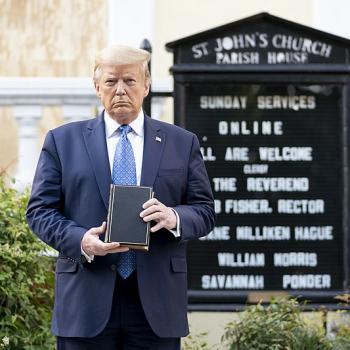 Every four years, pundits lard on the commentary about how “religion” is having a “big impact” on the upcoming election. Every four years.
Every four years, pundits lard on the commentary about how “religion” is having a “big impact” on the upcoming election. Every four years.
Each time they do it, they add on other comments about how this is “unusual” or “unprecedented,” as if religion just became a guiding force in how free people make decisions a week or two earlier.
In fact, religion has always been a matter of considerable importance in American elections. I don’t think there’s anything surprising about this. In fact, I don’t see how it could be otherwise. Are we supposed to shear ourselves loose from who we are when we are confronted with a ballot? Are we supposed to ignore our deepest values in making decisions about our country?
I think that all this talk is, at best, nonsense. Of course religious belief guides people’s decisions about how they vote. Of course it matters to people whether or not a candidate for an office shares their core values. We are talking about choosing who will run our government. Our votes place enormous governing power over the lives and welfare of millions of Americans into the hands of these candidates.
Are we supposed to elect someone who doesn’t share our values?
Should we deliberately decide to ignore the faith that guides us and the teachings that hold our lives together when it comes to deciding who we want to make key decisions for us? Why dose anyone find it surprising that “religion” plays a part in our ballot-box decisions?
We cannot see into the hearts of the people who ask us for our votes. We have to base our decisions on what they’ve done, what they say and how they hit us. Fortunately, our Constitution does not require us to explain our votes to anyone. We do not need the approval of a committee or a commission as to how we go about picking who we will support in an election.
I can vote for a candidate because she’s a woman. You can vote for a candidate because he or she is black … or white … or maybe because they are left-handed.
And yes, we can all vote for a candidate because they espouse positions on issues that we’ve decided are important to us but which other people claim we are stupid to consider. This is usually where voting for someone because of “religious” reasons comes in. If you are a strong believer in the right of workers to engage in collective bargaining and also a strong believer in the sanctity of human life, then how do you balance these two considerations in your vote?
The answer is that every single voter gets to work out conundrums like this on their own, as they please, and without being obliged to share their thinking OR their decision with anyone else. That’s the power of the secret ballot, which may be the most wonderful political invention since the idea of the vote itself.
I make it a policy not to try to tell Public Catholic readers how to vote. I also make it a policy to talk about the good and bad of candidates on both sides of these questions. My third policy is that I won’t say how I’m going to vote. My votes as a legislator are public record — as they should be. My votes at the ballot-box are those of an ordinary citizen. I vote by secret ballot.
What I will tell you is that you should never let someone else’s values be the reason for your decisions. Don’t let pundits persuade you that there is any wrong criteria you can use as a basis for deciding how to vote. It’s YOUR vote. It belongs to YOU. You can vote how you want, for whom you want, for any reason that works for you.
Now, go out there and think it through. If you should feel like praying about your vote and asking God for guidance, that, my friend, is your right. Use it any time you want.
 Content Director’s Note: This post is a part of our Election Month at Patheos feature. Patheos was designed to present the world’s most compelling conservations on life’s most important questions. Please join the Facebook following for our new News and Politics Channel — and check back throughout the month for more commentary on Election 2012. Please use hashtag #PatheosElection on Twitter.
Content Director’s Note: This post is a part of our Election Month at Patheos feature. Patheos was designed to present the world’s most compelling conservations on life’s most important questions. Please join the Facebook following for our new News and Politics Channel — and check back throughout the month for more commentary on Election 2012. Please use hashtag #PatheosElection on Twitter.












